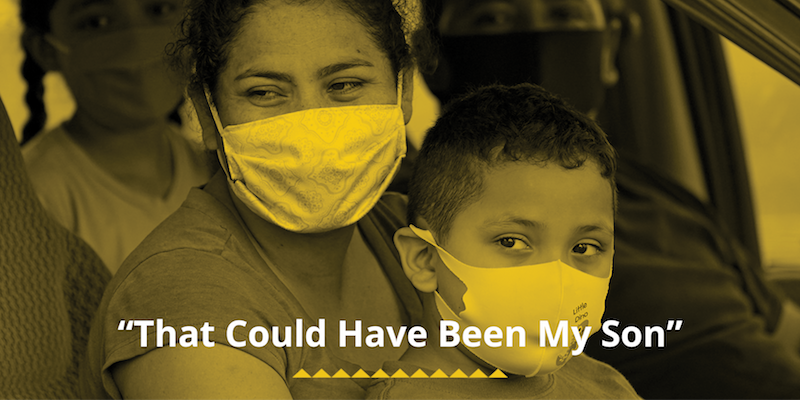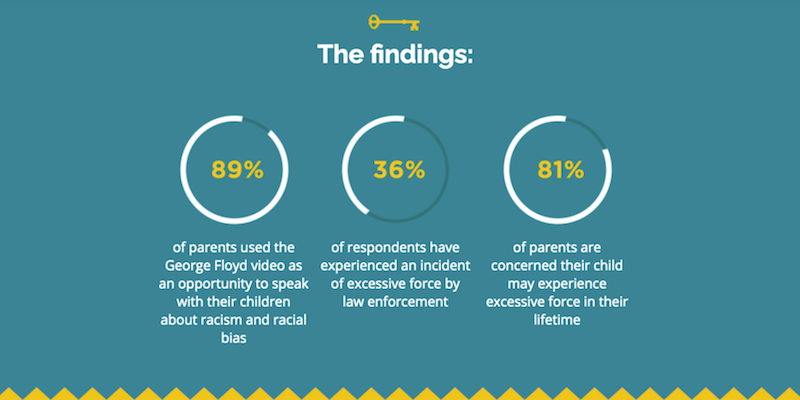
How Latino parents are teaching their children about racial inequity and police violence
When her oldest son, Vince, reached adolescence, he grew six inches in less than a year.
“We had to sit him down and have the talk,” says his mother, Eperanza Olan. “The talk” was not about puberty. “It was time for the ‘If a Cop Stops You’ conversation.”
Vince is tall, with curly black hair, and a medical bracelet for autism. He’s the son of a Mexican American mother and African American father. “When a cop stops you, they’re not going to look at your medical bracelet,” his mother told him. “They’re going to see your skin and hair color first.”
Confrontations Come Home
Vince has been bullied all his life, Esperanza Olan recounts, ever since elementary school, when children on the playground in Alamo, Texas, assaulted him with questions like, “What are you?” “Why don’t you speak enough Spanish?” “Why isn't your skin darker?”
Just recently, Vince was taking out the trash, and was cornered by a group of people in the neighborhood. They blocked his way home, threatening violence and yelling racist slurs at him in Spanish and English. Olan and her husband had to break up the confrontation, and bring Vince, very shaken, back home safely. Olan calmed him, saying, “You stood your ground but didn’t escalate. You didn’t go down to their level. You did the right thing.”
Facing Race
Talking to her children about race has not been easy. Although media coverage of police brutality and Black Lives Matter protests has dominated the news, Olan feels there hasn’t been enough discussion at her children’s school.
“I asked my kids how they wanted to celebrate Juneteenth. But none of them knew what it was.” Olan took it as an opportunity to teach her four sons about Texas’s Black history, and the long road to emancipation after the Civil War. Together they decided they would celebrate Juneteenth annually as a family.
The “If a Cop Stops You” conversation was less straightforward. The rules Olan laid out were clear: “No sudden movements, don’t reach for your cell phone, and never, ever run.” But, she said, it’s also important to know your rights, and advocate for yourself as well.
“We’ve always been taught to follow the rules, but it’s true it’s different for us, different for our kids,” she said. As a woman of color, she can’t depend on law enforcement to take her side—or the side of her children, she says. When Olan hears stories of young black men like Stephon Clark or Tamir Rice who were killed by police, she says, “That could be my son.”
In the National Latino Parent Survey conducted by Latino Decisions and Abriendo Puertas, nearly half of Latino respondents 18 to 29 years old, reported they had experienced excessive force from police. Indeed, studies show police use-of-force is among the leading causes of death for young men of color. In 2018, the American Journal for Public Health found the risk of mortality in police shootings was between 1.9 and 2.4 deaths per 100,000 for Black men, the Latino risk was between 0.9 and 1.2—and the risk for whites was 0.6 to 0.7 per 100,000.
“I told Vince that his size and skin color make him appear more threatening in some situations,” Olan says softly. “It’s sad, but it’s true.”

Children Are the Change
However grim the reality that her bi-racial children face systemic oppression, she’s careful to motivate them toward change. “I tell them: you can grow up to be a cop, and be a good one. You can grow up to be a senator and fight for people who look like you. We need great role models like you.”
Olan is deeply dedicated to her role as a parent in educating the next generation into anti-racism. “It’s not going to be easy, we’re still a young nation, we’re still learning. But it starts at home. The choices I make as a parent are opening up the past so my children can be the change.”
Growing up in an exclusively Latino family, Olan says, “I was not taught a lot about African American culture. I’m learning right alongside them. Our heritages are more alike than they are different. Each race has had to overcome so much. Imagine how powerful we could be if we united.”
.
.


